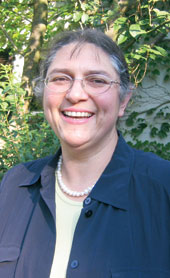About Ute Ritschel

Ritschel
Truly interdisciplinary and international, Ute Ritschel’s work combines art, performance art, environmental studies, and cultural anthropology. She has a master’s degree in acting and directing from the University of Kansas and completed a large research project on women performance artists in Germany and the United States at the University of Frankfurt. She studied cultural anthropology, art history, and arts administration in Germany, France, England, and the United States, and has also presented lectures and performances in England, Russia, Switzerland, and the United States. Ritschel calls her work “theory performance,” which is the presentation of academic research and fieldwork in an artistic performance.
Since 1995, she has produced the bi-annual exhibition “Vogelfrei—Art in Private Gardens” in Darmstadt, Germany. She began this project with 18 gardens and 29 artists, and her most recent iteration included 38 gardens and 75 artists from nine countries. In alternate years, she produces “Internationaler Waldkunstpfad,”with 20 artists from six countries each year. She was also the curator of the “Kunsttage Dreieich” where she curated two exhibitions per year in the City Gallery and one outdoor exhibition. In addition to her curatorial activities, she is active in the field of Performance Studies, and has organized conferences and founded a Center for Performance Studies in Germany.
According to Ritschel, “I felt like those big areas were mine to inhabit and change, to open up for other people.” Ritschel draws upon the experiences of mystery, transformation, and risk found in nature to create new opportunities in culture.
For Ute Ritschel, a leisurely stroll through the forest is not unusual, but every walk is unique. She has regularly perambulated fields and forests since childhood, discovering favorite trees and imagining new spaces with each encounter.
Academically trained in both anthropology and performance studies at programs in Europe and the United States, Ritschel’s interdisciplinary education and travel experiences were formative. After studying international theater, acting, and directing in Florence, Italy and Lawrence, Kansas, she returned to Germany to work as a dramaturg at the Nuremberg Theatre. Restless, she moved to Paris to study anthropology with Marc Augé. Ritschel says, “Social science helped me go in another direction.” Anthropology introduced concepts such as cultural comparisons, rituals, and fieldwork that expanded Ritschel’s appreciation for the role culture plays in communities.
Returning to Germany, Ritschel worked for seven years with a commercial gallery showing international artists in Darmstadt. Though she gained practical skills in producing catalogs, curating, and collaborating with artists, this commercial context was not the right fit for Ritschel. She wanted to help artists do projects with wider public appeal and interaction, especially using performance and installation. But how? Shifting her focus once again toward performance studies, Ritschel was invited to New York University as a visiting scholar and embarked on a major research project centered on the question, “Why would women do performance?” Ritschel interviewed leading women performance artists in her quest for an answer. Pioneers of Fluxus and “new genre public art,” many of the women Ritschel interviewed were actively blurring the lines between visual art and performance, private and public, art and activism.
Returning once again to Germany, Ritschel began teaching and became an independent curator creating exhibition projects outside of institutional settings. Her exhibitions—in private gardens, public forests, and city streets—are driven by evocative themes, adventurous aesthetics, and a relational impulse. For Ritschel, “Art events become laboratory situations. They give space for new inventions.” As such, her projects become interventions in human ecology.
Menu
- Home
- About Ute Ritschel
- Ritschel’s Work
- At UW–Madison
- Symposium